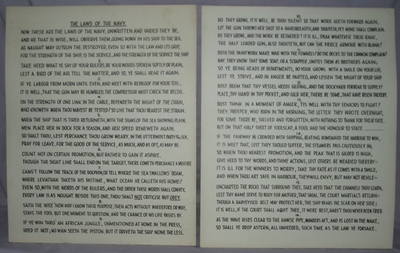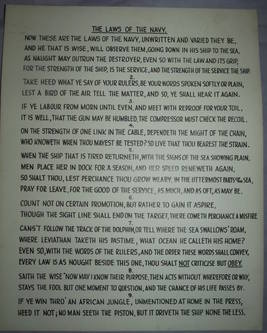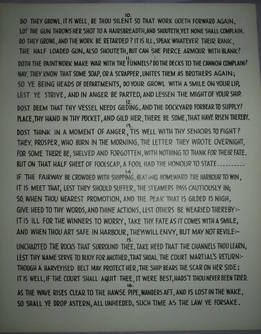
-
The Laws of the Navy Poem by Ronald A Hopwood.
- £14.00
The laws of the Navy by Ronald A Hopwood, printed on two boards.
Each board measures – 12 inches (30.5cms) x 15 inches (38cms).
In clean, presentable, readable condition.
The 23rd July 1896 issue of the British Army and Navy Gazette, printed a poem that was to become one of the Naval World's literary classics. Originally penned by Royal Navy Rear Admiral Ronald A. Hopwood, this work, titled "The Laws of the Navy", set forth what might safely be termed the "wisdom of the ages" for all who seek to make their way in large, hierarchical organizations, with special emphasis on the seagoing versions.
Now these are Laws of the Navy, Unwritten and varied they be;
And he that is wise will observe them, Going down in his ship to the sea;
As naught may outrun the destroyer, Even so with the law and its grip,
For the strength of the ship is the Service, And the strength of the Service, the ship.
Take heed what ye say of your Rulers, Be your words spoken softly or plain,
Lest a bird of the air tell the matter, And so ye shall hear it again.
If ye labor from morn until even, And meet with reproof for your toil,
It is well – that the gun may be humbled, The compressor must check the recoil.
On the strength of one link in the cable Dependeth the might of the chain;
Who knows when thou mayest be tested? So live that thou bearest the strain!
When the ship that is tired returneth, With the signs of the sea showing plain,
Men place her in dock for a season, And her speed she reneweth again.
So shall thou, lest, perchance, thou grow weary In the uttermost parts of the sea,
Pray for leave, for the good of the Service, As much and as oft as may be.
Count not upon certain promotion, But rather to gain it aspire;
Though the sight-line shall end on the target, There cometh, perchance, a misfire.
Can'st follow the track of the dolphin, Or tell where the sea swallows roam?
Where Leviathan taketh his pastime? What ocean he calleth his home?
Even so with the words of thy Rulers, And the orders those words shall convey.
Every law is as naught beside this one, "Thou shalt not criticise, but obey!"
Saith the wise, "How may I know their purpose?" Then acts without wherefore or why.
Stays the fool but one moment to question, And the chance of his life passeth by.
If ye win through an African jungle, Unmentioned at home in the Press,
Heed it not; no man seeth the piston, But it driveth the ship none the less.
Do they growl? It is well: be thou silent, So that work goeth forward again;
Lo, the gun throw her shot to a hair's breath, And shouteth, yet none shall complain.
Do they growl and the work be retarded? It is ill, speak, whatever their rank;
The half-loaded gun also shouteth, But can she pierce armor with blanks?
Doth the paintwork make war with the funnels? Do the decks to the cannon complain?
Nay, they know that some soap or a scrapper, Unites them as brothers again.
So ye, being Heads of Departments, Do your growl with a smile on your lip,
Lest ye strive and in anger be parted, And lessen the might of your ship.
Dost deem that thy vessel needs gilding, And the dockyard forbear to supply?
Place thy hand in thy pocket and gild her; There be those who have risen thereby.
Dost think, in a moment of anger, 'Tis well with thy seniors to fight?
They prosper, who burn in the morning, The letters they wrote overnight;
For some there be, shelved and forgotten, With nothing to thank for their fate,
Save "That" (on a half-sheet of foolscap), Which a fool "had the honour to state......"
If the fairway be crowded with shipping, Beating homeward the harbour to win,
It is meet that, lest any should suffer, The steamers pass cautiously in;
So thou, when thou nearest promotion, And the peak that is gilded is nigh,
Give heed to thy words and thine actions, Lest others be wearied thereby.
It is ill for the winners to worry, Take thy fate as it comes with a smile,
And when thou art safe in the harbour, They will envy, but may not revile.
Uncharted the rocks that surround thee, Take heed that the channels thou learn,
Lest thy name serve to buoy for another, That shoal, the Court-Martial Return.
Though Armour the belt that protects her, The ship bears the scar on her side;
It is well if the Court shall acquit thee; It were best hadst thou never been tried.
As the wave rises clear to the hawse pipe, Washes aft, and is lost in the wake,
So shall ye drop astern all unheeded, Such time as the law ye forsake.


